- Home
- Priscilla Royal
Wine of Violence mm-1 Page 4
Wine of Violence mm-1 Read online
Page 4
She prayed the crowner would prove more competent than at least two of the people in the room with her and that he would capture the perpetrator quickly. She already had more to deal with than the average new prioress without having to worry about a murderer on the loose.
“Very well, then,” she said, looking at each man until he shifted uncomfortably. “Let us see this young priest who will serve my sisters and succor the dying at our hospital.”
Chapter Seven
Simeon thumped Thomas’ shoulder with such enthusiasm that the young man staggered. The older monk’s face might have beamed with jovial greeting, but his dark eyes studied the younger with grim intensity. “You have just arrived from Grovebury then, brother?”
“Yes, my lord.” Thomas wanted to rub his aching shoulder, but he had been through such silent examinations before and knew when he was being appraised. This might be a world dedicated to God, but the unspoken rules were no different from the secular one. Acceptance at Tyndal was crucial to his success with this first assignment given by his grim new master, and he knew better than to show weakness of any kind. The ache in his shoulder receded.
A flicker of approval passed over Simeon’s face, and then he nodded to the porter. “Brother Andrew, bring some wine to wash the dust from our new brother’s throat.”
“I would be most grateful for it, my lord,” Thomas replied with calculated courtesy. As he smiled in thanks, he would have sworn the short, bald monk winked at him before dropping his eyes modestly and limping dutifully toward the wine pitcher. Brother Andrew slopped some deep red liquid from the ewer into a gold goblet and handed it to Thomas.
He gazed down at the object in his hand. It was an unusually opulent thing to find in such a remote house, Thomas thought. The priory’s uncharacteristic financial downturn had tweaked the interest of some high churchman, at least enough to use it to test Thomas’ investigative skills, yet clearly its members had not felt sufficient distress to sell any of its valuable plate. Despite its plain design, the goblet was still gold and well-crafted. Then he glanced at the table and noted four similar goblets. Odd too that such rich possessions would be brought out for daily use, and by the prior, who was not even responsible for the entertainment of important guests under normal circumstances. He wondered what quality of plate the prioress had in her lodgings.
Thomas sipped the smooth and mellow wine. It was of superior quality as well. If Tyndal had a generous patron who guaranteed a good supply of fine wine to make diminished wealth more palatable, Thomas’ human raven had failed to mention it. Or perhaps he didn’t know about such a benefactor. Or perhaps he was misinformed about the entire situation. Ignorance of what really happened in places or amid people deemed to be of minor or no importance was not unusual amongst those at the pinnacles of power. Thomas remembered some of his former masters with mild derision and enjoyed another sip of the wine.
“You elevated me beyond my station, however.” Simeon’s words were humble, but as Thomas looked up at the tall monk’s expression, he knew he had quite pleased the man.
“I am Brother Simeon, receiver and sub-prior of Tyndal.”
Thomas bowed graciously.
Simeon gestured to the man at the head of the table. “Prior Theobald leads us.”
“My lord.” As Thomas humbled himself once again, he noted the prior’s blinking eyes and aimlessly fumbling hands. A pathetic and ineffectual old man, he decided, and hardly the real center of power here. That, he concluded, was Brother Simeon, whose formidable size and vitality overwhelmed the room.
With a sharp stab of pain, Thomas once again missed Giles. In the old days, they would have made Theobald into prime fodder for parody. Now there was no one with whom he could later mock such a feeble, aged master in the time-honored tradition of young clerks. Then with some surprise Thomas realized he felt sorry for the old prior. Maybe the days were past when he could find joy in mocking men whose manhood existed only in memory. He snorted quietly. Was he much different himself from this impotent prior? Thomas lowered his head to keep his moist eyes from public gaze.
“Excuse me, brother, but I did not hear your name?”
Thomas started. The voice was distinctly feminine and quite melodic.
Simeon stepped aside.
Sitting at the table behind the receiver were two nuns. One was a woman of middle years, stout about the hips and waist. The other was youthful and quite diminutive. The first must be the prioress, Thomas thought. She looked sour enough, her forehead deeply ridged in what must be a perpetual frown, and, although her eyes were lowered, he could sense their look of constant disapproval. The young one, however, looked directly at him, her gray eyes alert with curiosity and her complexion flushed a healthy pink. Too tiny all over for my taste, Thomas thought with irreverent amusement.
Simeon cleared his throat. “Forgive me,” he said, rudely pointing his finger at the young nun. “Prioress Eleanor of Wynethorpe has just arrived from Amesbury but a day or so ago.” With far greater courtesy and warmth, he gestured toward the elder. “This is Sister Ruth, our esteemed porteress for the nuns.”
Thomas blinked in surprise. He watched as Prioress Eleanor’s eyes briefly narrowed in what he suspected was carefully controlled anger, then quickly cleared and began to appraise him. Perhaps, he thought, it might not be wise to dismiss this young woman, as Simeon appeared to be doing. Had the person in front of him been a man who could control his emotions with such iron will, he would have accorded him more respect.
Thomas bowed. “My lady, I am Brother Thomas. Here to serve your will.”
“And what skills do you bring me, brother?”
“Humble ones. I have come lately to the priesthood.”
“Indeed, but previously a clerk, I see. What brought you to choose a cloistered vocation over the earthly rewards at a king’s court?”
Thomas paled. Surely this prioress could not know his real background. His black-clad liberator had promised him anonymity in exchange for his oath of fealty.
“Do not be so surprised, brother. With such soft hands, you are surely no man of arms, although I wonder why not with your height and that breadth of shoulders.” She smiled warmly, then laughed with a straightforward heartiness.
Sister Ruth pressed her lips together into a rigid white line.
Thomas smiled in return with more warmth than he felt. You, my lady prioress, are more observant that I would expect from a woman of your youth and vocation, he thought, and more than makes me comfortable.
“Indeed,” he said aloud, “I was a clerk, thus I have some knowledge of Latin and law. As for my choice of the cloister, my shoulders may be broad but my soul cried out to serve God in a more contemplative setting, not on the field of battle or in the courts of kings.”
“Well said, brother. I think our sisters will be lucky to have such a priest as their spiritual guide.”
Her phrasing was smooth as river rock. As he bowed his head in humble thanks at her courtesy, Thomas knew by her amused smile that she was not deceived in the slightest by his fine and empty words.
***
When Eleanor first looked at Brother Thomas, as he walked into the prior’s chambers, and saw blue eyes the color of the summer sea and hair the shade of burnished copper, she felt heat, then shuddered as if chilled. He had all the legendary beauty of Satan’s own angels.
The suddenness, no, the strength of her attraction to the young monk startled her. This was not just a playful, almost innocent tickling of pleasure to be enjoyed for a moment, confessed, then forgotten. She felt as if a bonfire had been set alight in her entrails. This was no easily ignored and set aside desire. This was lust. And why had God chosen now of all times to give her the added burden of conquering such a passion? Didn’t she have problems enough?
Yet God had not completely abandoned her. Even as she felt her face flush, she had struggled, then regained control of her reason and calmly questioned the man. He had seemed oddly taken aback at her observation
that he must have been a clerk. Perhaps he had been insulted, assumed she thought he was of a rank too low to be trained in the knightly arts of war, or had not thought him man enough. Nevertheless, he had quickly recovered and shown the smooth tongue of one at ease with courtly manners. A younger son of someone of rank sent to make his way in the Church with or without any calling to it, she thought. Or else a by-blow. If the latter, she might be better off. Her aunt had said that those born to the mighty without the benefit of legitimacy often understood the ephemeral nature of worldly rank and comforts better than a younger son who had grown up in the ease of it.
Whatever his lineage, he was a priest with some training in law. She could see no reasonable grounds to refuse him as the offered replacement for Brother Rupert. Without a priest to perform sacraments for her nuns and the hospitalized dying, the priory could not function properly. She herself must have an educated man to assist her in the administrative work. For the moment, she would have to put her own feelings aside and accept him, but deep inside she trembled for her own emotional security. How she wished Sister Beatrice was waiting for her in her chambers with comfort and advice.
“I am grateful to you for your offer of Brother Thomas to fill the position we so desperately need.” Eleanor turned to face Theobald and Simeon, hoping that they could not see her slight trembling.
“I believe it to be best…” Prior Theobald began.
“And I accept your recommendation. At least for the time being. Our immediate concern, of course, must be Brother Rupert’s murder. The effect on our priory and indeed the implications for our very safety within the walls are paramount. Once the crowner has examined his body and decided what must be done to apprehend the killer, we can discuss further and in greater detail how the monks and lay brothers should be used to run our hospital and priory as well as serve the parish efficiently. At that time I will decide whether Brother Thomas can fulfill all his duties to my sisters without assistance. In the meantime…”
Thomas coughed. “Forgive me, my lady, but did you say murder?”
“Yes, brother. We have suffered a monstrous slaying in our midst. Brother Rupert, an elderly priest of our house, was found this morning in the nuns’ cloister garth, stabbed and castrated.”
Eleanor studied the young monk’s face. He had paled a bit at the news but otherwise showed little emotion. “In your studies of law,” she continued, “did you ever have occasion to investigate questionable deaths?”
***
The news that someone had been murdered and the prioress’ query about questionable deaths took Thomas’ mind back to the nights when he was a young lad and had heard muffled cries and scufflings in the dark passages of his father’s castle just outside the room in which he slept. He was never sure if the sounds were those of ghosts and demons or were of human origin, but he remembered how rigid he had lain in his tiny bed, his eyes focused in terror on the wavering shadows and pale shifting lights that danced tauntingly on the walls of his room. As soon as the gray morning light illuminated the familiar forms of straw and wood, he would slip outside his door, where he’d sometimes find brown stains on the stones, then he would tremble with fear at what might have happened all too close to him in the hours of darkness.
Even later on in his adult years, there was the morning he had entered the chamber of a well-hated deacon to find the man’s frozen and twisted body on the bed. Oh, he was told by a grinning servant, the master must have died from eating a dinner of bad eels. Did anyone die of food poisoning with such an expression of agonized horror on his face? Thomas suspected not but knew better than to voice his doubts.
So had he ever had occasion to investigate questionable deaths? No, he said to himself, he’d had more sense. Aloud, Thomas replied, “My education was academic, but both the study and practice of law require the exercise of reason and observation.”
“Indeed. I hope you have a strong stomach as well. Brother Rupert is not a pretty sight.”
Thomas lowered his eyes to hide his surprise at the bluntness of his new prioress. This woman did not behave like any of the other young women he had known. The sight of a tiny, live mouse was enough to cause them to scream and throw themselves into the arms of the nearest man, but this one was quite calm in her discussion of a man’s mutilated corpse. He might have expected an older, married woman to be this composed. After all, he’d heard tales of how some wives successfully defended castles while their lords were elsewhere, but a woman of the prioress’s youth? Never. Perhaps whatever changed some aging women into more manlike creatures happened to women of any age who devoted themselves to God? Thomas could think of no other explanation.
“My stomach will be strong enough, my lady,” he replied at last.
“Good,” the prioress said. “You must examine Brother Rupert’s body now, if you will. Perhaps you will see something both Sister Anne and I missed. After that you will arrange to take his body to a more fitting place to lie. I have forbidden the nuns access to the garden until the crowner has done whatever examination he deems fit, but Brother Rupert should rest in peace in a chapel tonight. It is unseemly that the poor man remain exposed in the cloister garth until the morrow.”
Thomas glanced over at both Prior Theobald and Brother Simeon for guidance. The good prior was stroking his cross, his eyes vague and his expression confused. The receiver stood with chin in hand, gazing at the prioress with a slight frown, then he turned and gave Thomas a quick nod.
“Of course, my lady,” Thomas said. “As you wish.”
Chapter Eight
Eleanor pressed her hand to her heart, then bit her lip. She was not surprised at the brief exchange between Thomas and Simeon. She should have expected that the young priest would seek approval from the two older men before obeying her. Still the gesture had stung her with a disproportionate pain. Thomas must be new to the Order, she told herself. Like both Simeon and Theobald he would soon learn that it was she who was in charge at Tyndal. Once he did, he would look to her for direction, not them.
Then she winced. Oh, don’t be such a fool, Eleanor, she said to herself, shaking her head in disgust. It’s not your position as head of the priory that you want him to recognize. You want him to see you as a woman. A worldly creature you still are, whatever your vows. Your muscles were like water walking so near him down the stone stairs from the prior’s chambers, and you tremble with the sickness of lust. If God meant to purge your soul of any pride in becoming prioress to the religious at Tyndal, He has succeeded well.
She had always thought obedience would be the vow with which she’d struggle most. She was quite amply endowed with a high spirit. For cert, the vow of poverty had never been a problem for her. She had grown up in comfortable simplicity at Amesbury and such was her definition of poverty. Being used to that life, she even preferred it.
But lust? Virgin she might be, but innocent she was not. Not after living with two older brothers and a castle full of young men in the year she’d spent with her father before she had taken her final vows. She had played at courtly love and quite enjoyed the feints and parries of it all, but it was only a game to her and she had never lost sight of or the desire for her vocation. This was surely the first test of her vows. And, she thought with grim determination, I shall win the contest.
As they stepped into the dappled light of the monks’ cloister walk, Eleanor glanced at Sister Ruth walking next to her in silence. The nun’s eyes were downcast, and her mouth was pursed as if she had just tasted something bitter. Had the older woman recognized what her young prioress was feeling? Perhaps God was kind and she had noticed nothing. Certainly Eleanor did not need any further marks against her in her new community. Or perhaps the porteress had never experienced lust and would not recognize the symptoms.
For just an instant, Eleanor felt a tinge of envy.
***
The trio passed in silence through the covered cloister walk, keeping a modest distance from the few monks strolling there, and on toward
the passage leading into the outer court.
She heard a muffled laugh and glanced quickly over her shoulder. The young monk was smiling in some private amusement. Seeing her turn to him, he looked down quickly. Had he noted the effect he had on her? Was that the source of his mirth? She scowled, hoping he noted her severity just as well. Then her own eyes turned traitor and quickly feasted on all of him from head to foot before she was able to drag her gaze back to a more seemly concentration on the stone walk at her feet.
He did look more suited to charger and armor than cowl and tonsure. Still, tonsured and cowled he was, whatever the true reason for his recent calling. She certainly did not believe the glib tale he had told her. He had shown a courtly manner and physical comfort with his body rarely found in younger monks. Although he towered over both Sister Ruth and Eleanor, he seemed in control of his size and strength and kept an easy, slow pace behind her as they walked into the dark, narrow passage under the monks’ dormitory and up to the heavy wooden door.
“This is the path you will take when you come to serve us. And you will use it to return when you are done.” Eleanor inserted a large key, unlocked the door, then turned and handed the key to Thomas. “This is now yours as priest to my nuns and the sick. Besides you, Prior Theobald has such a key and Brother Andrew also because he is porter. Of the nuns, only Sister Ruth as porteress, Sister Christina and Sister Anne, who are both in charge of the hospital, and I may have such keys. Please keep it safe and lend it to no one. These locked doors keep us protected from the world.” Eleanor heard a sharp intake of breath from the nun beside her and winced. At least the doors had done so until the death of Brother Rupert, she thought.

 The Twice-Hanged Man
The Twice-Hanged Man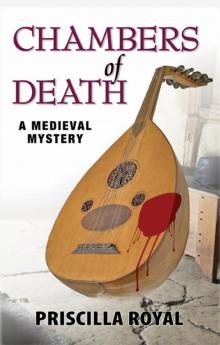 Chambers of Death mm-6
Chambers of Death mm-6 Forsaken Soul
Forsaken Soul Covenant With Hell (Medieval Mysteries)
Covenant With Hell (Medieval Mysteries)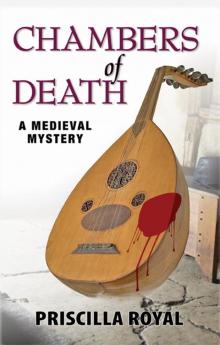 Chambers of Death
Chambers of Death Tyrant of the Mind
Tyrant of the Mind Wild Justice
Wild Justice Sorrow Without End
Sorrow Without End Wine of Violence
Wine of Violence Tyrant of the Mind mm-2
Tyrant of the Mind mm-2 The Sanctity of Hate
The Sanctity of Hate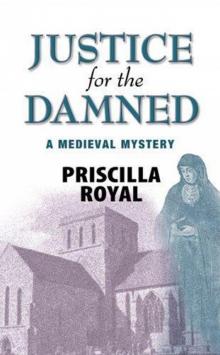 Justice for the Damned
Justice for the Damned The Proud Sinner
The Proud Sinner A Killing Season mm-8
A Killing Season mm-8 Forsaken Soul mm-5
Forsaken Soul mm-5 Valley of Dry Bones mm-7
Valley of Dry Bones mm-7 Valley of Dry Bones
Valley of Dry Bones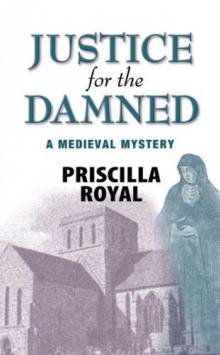 Justice for the Damned mm-4
Justice for the Damned mm-4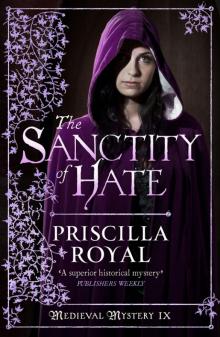 Sanctity of Hate
Sanctity of Hate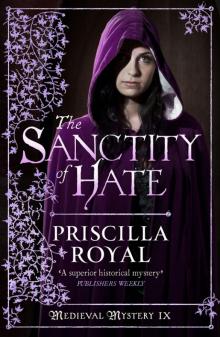 Sanctity of Hate mm-9
Sanctity of Hate mm-9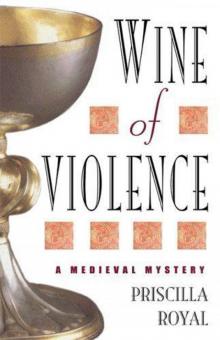 Wine of Violence mm-1
Wine of Violence mm-1